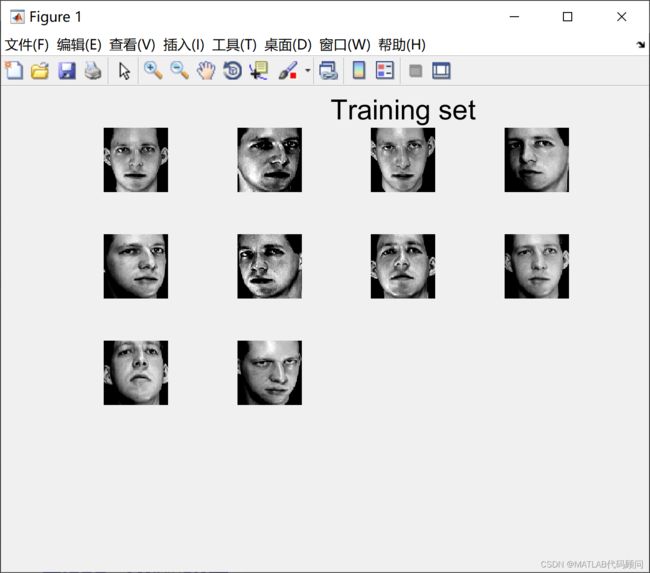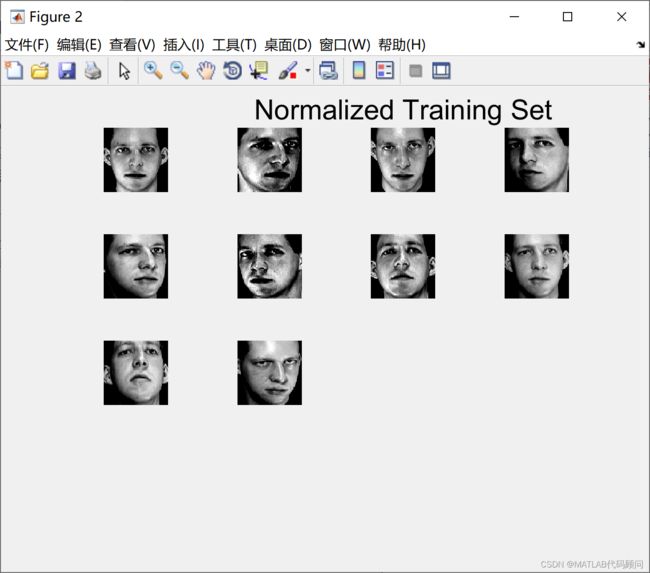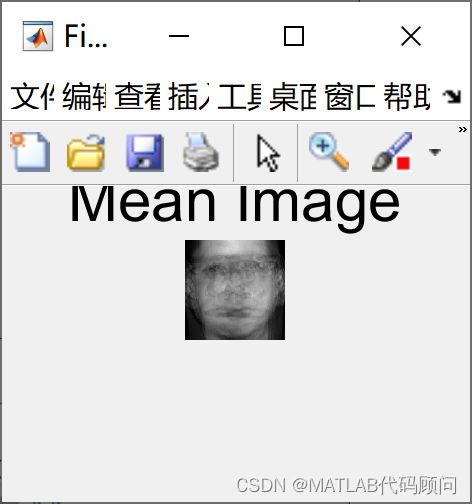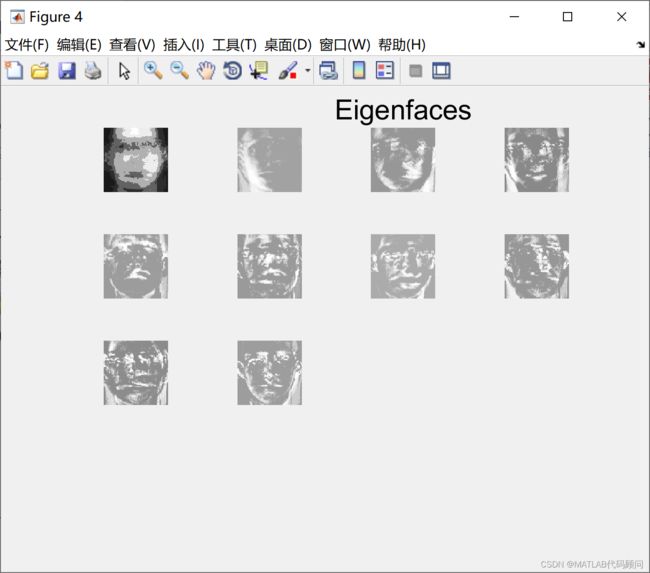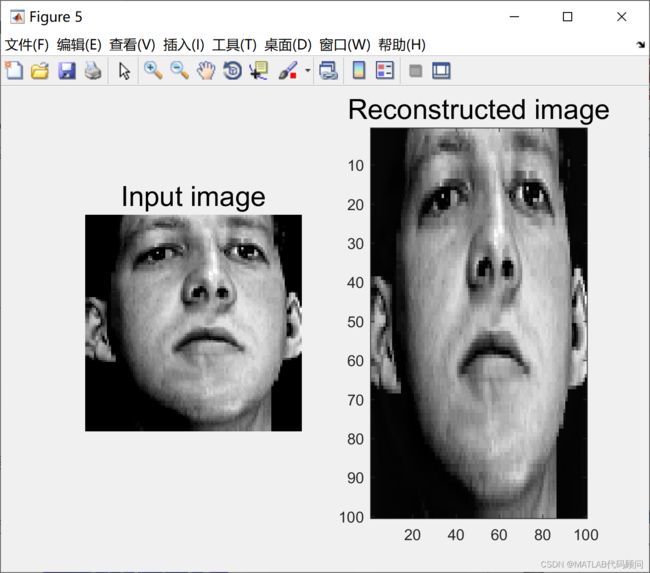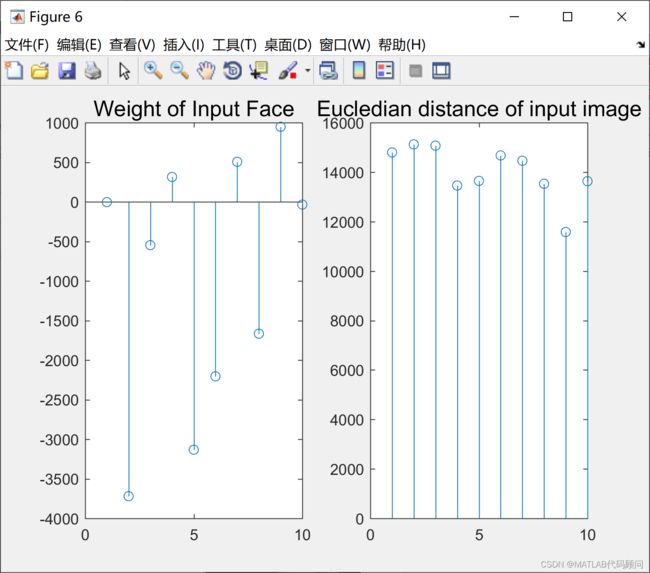特征脸的人脸识别MATLAB程序(附完整代码和结果)
基于特征脸的人脸识别主体流程为:
1.读取训练数据和预处理:读取脸的图片数据后,将每个人脸转换为一个列向量,训练集人脸构成一个矩阵A。
2.求平均脸:对每一行都求平均值,得到一个列向量,我们称之为“平均脸”,是所有人脸的平均。
3.样本规范化:矩阵A的每一个脸都减去平均脸乘以标准差。
4.求特征脸:提高A的协方差矩阵C,再求C的特征向量。每一个特征向量就是“特征脸”。特点:也即原始的人脸都可表为特征脸的线性组合。
5.构造脸空间:取出特征值较大的特征脸,构成投影矩阵。
5. 脸投影:每一个训练集的脸投影到脸空间中,得到脸空间中的一个点。
6.识别:读取待识别的人脸图片数据,投影到脸空间,依次与脸空间中训练集的点进行比较距离,距离最小的即为识别出的脸
采用特征脸的人脸识别MATLAB程序如下:
% Face recognition
%人脸识别代码
clear all
close all
clc
%训练集数目
M=10;
% 选择标准差和均值 它可以是任何接近大多数图像的标准和平均值的数字。
um=100;
ustd=80;
% 读取和显示图像
%读入M个训练图像并显示在一个窗口上
S=[]; %img matrix
figure;
for i=1:M
str=strcat(int2str(i),'.bmp'); %concatenates two strings that form the name of the image
eval('img=imread(str);');
subplot(ceil(sqrt(M)),ceil(sqrt(M)),i)
imshow(img)
if i==3
title('Training set','fontsize',18)
end
drawnow;
[irow icol]=size(img); % get the number of rows (N1) and columns (N2)获得图像的大小,所有图像的大小要一致
temp=reshape(img',irow*icol,1); %creates a (N1*N2)x1 matrix一幅图像构造一个向量 向量的大小和图像大小有关
S=[S temp]; %X is a N1*N2xM matrix after finishing the sequence 生成一个向量矩阵,M个图像有M列
%this is our S
end
%Here we change the mean and std of all images. We normalize all images.
%This is done to reduce the error due to lighting conditions.
%下面是对图像规范化,更具所有图像的的平均值和方差
for i=1:size(S,2)
temp=double(S(:,i));
m=mean(temp);
st=std(temp);
S(:,i)=(temp-m)*ustd/st+um;
end
%show normalized images 显示规范化后的图像
figure;
for i=1:M
str=strcat(int2str(i),'.bmp');
img=reshape(S(:,i),icol,irow);
img=img';
eval('imwrite(img,str)');
subplot(ceil(sqrt(M)),ceil(sqrt(M)),i)
imshow(img)
drawnow;
if i==3
title('Normalized Training Set','fontsize',18)
end
end
%mean image;显示平均图像,所有图像叠加在一起
m=mean(S,2); %obtains the mean of each row instead of each column
tmimg=uint8(m); %converts to unsigned 8-bit integer. Values range from 0 to 255
img=reshape(tmimg,icol,irow); %takes the N1*N2x1 vector and creates a N2xN1 matrix
img=img'; %creates a N1xN2 matrix by transposing the image.
figure;
imshow(img);
title('Mean Image','fontsize',18)
% Change image for manipulation
% 对图像变换便于处理
dbx=[]; % A matrix
for i=1:M
temp=double(S(:,i));
dbx=[dbx temp];
end
%求协方差矩阵 C=A'A, L=AA'
A=dbx';
L=A*A';
[vv,dd]=eig(L);% vv是L的特征向量, dd是L=dbx'*dbx和C=dbx*dbx'的特征值;
% 对特征值进行排序并去掉0
v=[];
d=[];
for i=1:size(vv,2)
if(dd(i,i)>1e-4)
v=[v vv(:,i)];
d=[d dd(i,i)];
end
end
%sort, will return an ascending sequence
%排序并返回降序的
[B index]=sort(d);
ind=zeros(size(index));
dtemp=zeros(size(index));
vtemp=zeros(size(v));
len=length(index);
for i=1:len
dtemp(i)=B(len+1-i);
ind(i)=len+1-index(i);
vtemp(:,ind(i))=v(:,i);
end
d=dtemp;
v=vtemp;
%对特征向量进行规范化
for i=1:size(v,2) % 每一列循环
kk=v(:,i);
temp=sqrt(sum(kk.^2));
v(:,i)=v(:,i)./temp;
end
%得到C的特征向量矩阵
u=[];
for i=1:size(v,2)
temp=sqrt(d(i));
u=[u (dbx*v(:,i))./temp];
end
% Normalization of eigenvectors
for i=1:size(u,2)
kk=u(:,i);
temp=sqrt(sum(kk.^2));
u(:,i)=u(:,i)./temp;
end
% show eigenfaces;
%显示特征脸
figure;
for i=1:size(u,2)
img=reshape(u(:,i),icol,irow);
img=img';
img=histeq(img,255);
subplot(ceil(sqrt(M)),ceil(sqrt(M)),i)
imshow(img)
drawnow;
if i==3
title('Eigenfaces','fontsize',18)
end
end
% 找出训练集中每张脸的权重
omega = [];% 训练集中脸的权重
for h=1:size(dbx,2)
WW=[];
for i=1:size(u,2)
t = u(:,i)';
WeightOfImage = dot(t,dbx(:,h)');
WW = [WW; WeightOfImage];
end
omega = [omega,WW];
end
% Acquire new image
% Note: the input image must have a bmp or jpg extension.
% It should have the same size as the ones in your training set.
% It should be placed on your desktop
%获取一张新的脸
%注意:图像的大小和训练集中图像大小一样
%
% InputImage = input('Please enter the name of the image and its extension \n','s');
InputImage='9.bmp';% 输入
InputImage = imread(strcat(InputImage));
figure;
subplot(1,2,1);
imshow(InputImage);
colormap('gray');
title('Input image','fontsize',18);
InImage=reshape(double(InputImage)',irow*icol,1);
temp=InImage;
me=mean(temp);
st=std(temp);
temp=(temp-me)*ustd/st+um;
NormImage = temp;
Difference = temp-m;
NormImage = Difference;
p = [];
aa=size(u,2);
for i = 1:aa
pare = dot(NormImage,u(:,i));
p = [p; pare];
end
ReshapedImage = m + u(:,1:aa)*p; %m is the mean image, u is the eigenvector
ReshapedImage = reshape(ReshapedImage,icol,irow);
ReshapedImage = ReshapedImage';
%show the reconstructed image. 显示重构的图像
subplot(1,2,2);
imagesc(ReshapedImage);
colormap('gray');
title('Reconstructed image','fontsize',18);
InImWeight = [];
for i=1:size(u,2)
t = u(:,i)';
WeightOfInputImage = dot(t,Difference');
InImWeight = [InImWeight; WeightOfInputImage];
end
ll = 1:M;
figure;
subplot(1,2,1)
stem(ll,InImWeight)
title('Weight of Input Face','fontsize',14)
% 查找欧几里得距离
e=[];
for i=1:size(omega,2)
q = omega(:,i);
DiffWeight = InImWeight-q;
mag = norm(DiffWeight);
e = [e mag];
end
kk = 1:size(e,2);
subplot(1,2,2)
stem(kk,e)
title('Eucledian distance of input image','fontsize',14)
MaximumValue=max(e)
MinimumValue=min(e)
需要讨论的可以加Q1579325979
程序结果如下:
